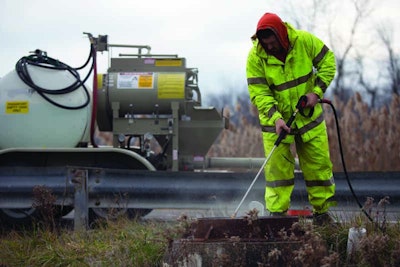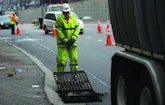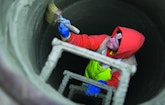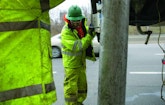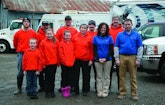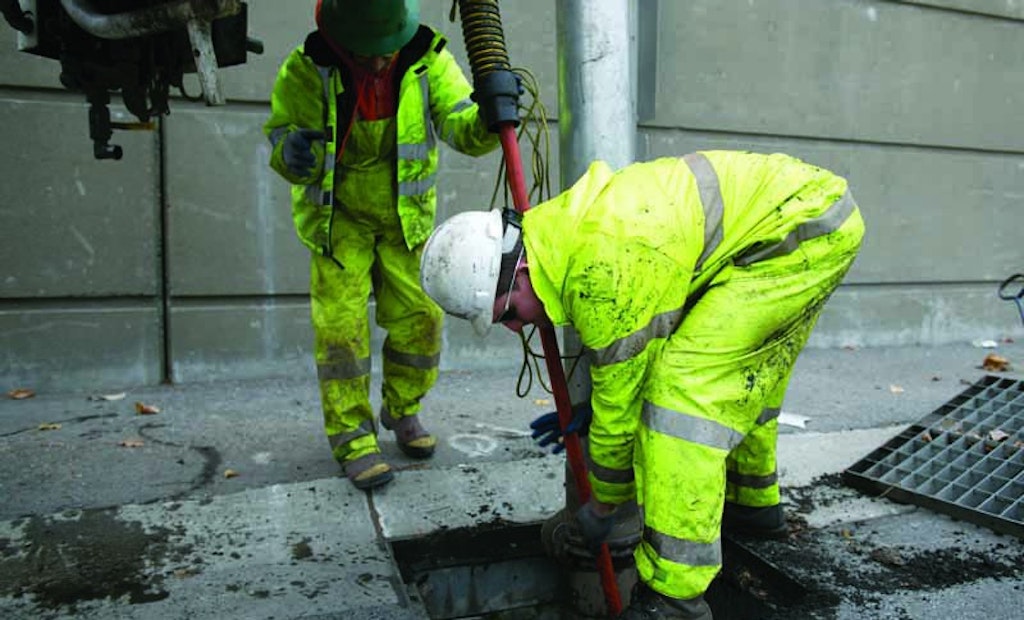
Interested in Cleaning?
Get Cleaning articles, news and videos right in your inbox! Sign up now.
Cleaning + Get AlertsIf anyone ever was destined to run a sewer services company, it’s Kerry Roslinski.
The son of a Public Works director as well as a former wastewater treatment plant operator, Roslinski brought his career full circle in 2003 when he established Pipe-Eye Sewer Services in Bradford, Pennsylvania, a company that cleans, inspects and grouts sewer lines, laterals and manholes in the area where he grew up.
In a sense, even the name of the company is pipeline-related; when Roslinski was about 11 years old, he fell down and landed on a pipe, which left a half-moon scar under one eye. “So kids at school nicknamed me ‘Pipe Eye,’” Roslinski explains. “It’s very ironic … and that’s why in our logo, we use an eye for the dash in ‘Pipe-Eye.’”
When Roslinski established Pipe-Eye in 2003, it was the culmination of decades spent in the municipal sewer arena, dating back to when he was a young boy. Roslinski’s late father, Joseph, served as Bradford’s director of Public Works for 35 years and along the way instilled in his son the importance of customer service.
“When I was a child, I would go out with my father and ride in street sweepers, salt trucks and so forth,” Roslinski recalls. “I grew up in that atmosphere night and day. … People were always calling our house with problems, and Dad was always right on top of them.
“I have to stress the experience I gained from my father,” he adds. “I saw the way he treated his employees through all those years — that really carried over, and in the end, I took a lot from that. He treated people with dignity and respect. If you don’t have good employees with some longevity, you’re just not going to make it in this industry. My father taught me that you have to treat employees just as you’d like to be treated.”
Roslinski says much of his company’s success stems from upholding his father’s legacy, as well as embracing advanced technology and presenting a professional image. The results speak for themselves: eight full-time employees, more than $1.5 million worth of equipment, and a service area that covers western New York and northwestern Pennsylvania. Sewer cleaning and inspection services generate about 65 percent of the company’s revenue, with the remainder coming from grouting and smoke and dye testing, he says.
Roslinski also relies heavily on the wealth of experience he gained working for municipal governments and observing how they operate. “I learned how to interact with the municipal government and gain a good understanding of how things work,” he notes.
Pipeline to success
After graduating from college with a degree in forestry, oddly enough, Roslinski started his sewer-centric career by operating several small wastewater treatment plants, some on a part-time basis. After about seven years, he received his first exposure to sewer cleaning and inspection technology when a local sewer authority brought in a company from Pittsburgh to clean and inspect sewer lines.
“That really grabbed my attention,” he recalls. “Operating an inspection camera was like playing Atari games. … I was thrilled by the idea that you could operate a camera with a joystick.”
Eventually, Roslinski joined the company as an operations manager in Bradford, where he helped expand the firm’s business base, using connections he’d made during his years as a treatment plant operator. But when the company was sold to a large nationwide corporation, Roslinski decided he didn’t want to move to Pittsburgh to keep his job and instead struck out on his own.
While he was no novice to the industry, he still needed advice as well as financing to invest in equipment. The advice came from a branch of the University of Pittsburgh, where a business school intern helped him develop a business plan — for free. “Local universities are a good resource,” he says. “At the University of Pittsburgh, interns had all the software programs and tools you need to get started. And for a nominal fee, they even filed my incorporation paperwork.”
Then he met with officials at Hi-Vac who eventually agreed to help him finance an Aquatech vacuum truck. A short time later, he bought a refurbished grout truck built by CUES. How could a novice businessman afford to buy such an expensive rig? The resourceful Roslinski did some research and learned about low-interest loans offered by the City of Bradford’s Office of Economic and Community Development, which promotes small businesses. “They supply half the loan, and a bank provides the other half at interest rates that are about half of those charged by regular banks,” Roslinski explains. “I also used another resource called the North Central Regional Planning and Development Commission, which covers a four-county area here.
“If you’re looking to make a major investment that can potentially create jobs or make current jobs last longer, they’re all for it — as long as you meet certain criteria and report back to them on your progress in creating and retaining jobs,” he adds. “All you have to do is go to a local county government and ask if there’s any financial assistance available. This is how we financed all our equipment except for the first vacuum truck.”
Large roster of equipment
Pipe-Eye now owns three Hi-Vac Aquatech vac trucks, built on International and Sterling truck chassis. They feature 10-cubic-yard debris tanks; 1,000- or 1,500-gallon water tanks; Hibon blowers; and water pumps (80 gpm at 2,000 psi) made by General Pump.
“We primarily clean larger-diameter municipal pipes,” Roslinski says. “But we can hook up a smaller lateral hose to clean out smaller pipes.”
The company also owns three CUES camera/grout trucks, two built on a Chevrolet chassis and one on a Ford; they’re all equipped with Graco grout pumps. The two newer units feature lateral inspection and lateral and mainline grouting capabilities. For inspections, crews use CUES Ultra Shorty tracked cameras. Logiball makes the grouting systems, and Pipe-Eye uses grout made by Avanti International.
The company also relies on a smoke-testing machine made by Cherne; a RIDGID push camera and several RIDGID locators; a CST/berger Magnatrac locator; a RIDGID K-6200 Powersnake for unclogging 3- to 6-inch-diameter lines; jetting nozzles manufactured by StoneAge and KEG Technologies; and a manhole-rehabilitation trailer made by The Strong Company.
“One of my big things is that I stick with the same equipment all the time,” Roslinski says, explaining his philosophy about buying equipment. “Because we stick with the same equipment, our guys know it inside and out.
“I also go to the Water & Wastewater Equipment, Treatment & Transport (WWETT) Show every other year,” he adds. “I take two different employees each time, along with my wife, Jennifer (the company’s office manager). Customers demand the most updated technology, so we’re constantly striving to keep up with it. Companies that fail to do so run the risk of losing customers to competitors who do keep up with the latest technology.”
Professional image counts
Roslinski also says that Pipe-Eye’s emphasis on keeping equipment clean and well-maintained creates a professional image that wows new customers and promotes word-of-mouth referrals. “When we pull up on a job, it may not be with brand-new equipment, but it looks like it just came off the showroom floor,” he says. “Our guys wax the trucks — the whole thing. Image is everything. … Our equipment isn’t dirty or rusted, and that says a lot about our reputation and our employees. Customers notice that.”
Newer, well-maintained equipment also helps in another area: retaining quality employees. “That’s just one of the things I try to do for my guys,” Roslinski notes. “They’re out in the field doing the hard work. My job is to ensure they have the latest and the greatest equipment. Who wants to go to work in a rusty old wreck? My employees make the clients happy, not me. All I do is provide them with good, up-to-date and safe equipment and they go out and please the clients.”
That raises another point: No matter how nice the equipment is, it takes great employees to operate it. “Our guys make things happen out in the field every day,” he notes.
Looking ahead, Roslinski envisions what he calls “controlled growth” for Pipe-Eye as opposed to exponential growth that could strain manpower and equipment resources and, in turn, decrease customer satisfaction. He also plans continued investments in new equipment, which he says is imperative to remaining competitive despite the financial risks involved. As an example, he points to the recently purchased manhole-rehabilitation trailer, which allows Pipe-Eye to structurally repair manholes, and a new 2015 CUES grout rig.
“Before, we could grout and seal manholes to stop inflow and infiltration, but we didn’t have a steadfast way to provide structural rehabilitation,” he explains. “The trailer will open up the door for manhole rehab projects, which go hand in hand with what we’re already doing here at Pipe-Eye.
“I also see the grouting market getting bigger, at least in my neck of the woods,” he adds. “Grouting is making a resurgence. … We’re banking on grouting and manhole rehab work.”
